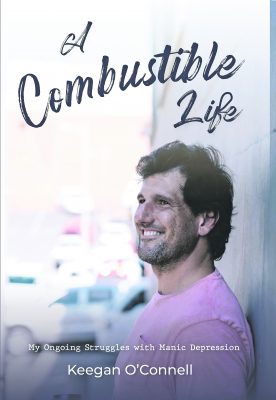Facing his share of depression, Keegan O’Connell is actively advocating inclusivity and equality in making mental health treatment accessible to everyone. He sheds light on the often misunderstood world of living with a debilitating mental illness, and how we can help fight the stigma.
As a mental health advocate and through awareness initiatives and the sale of his book, Keegan hopes to raise funds for those who don’t have access to the necessary mental health care. The Durbanite’s book, A Combustible Life, delivers a raw and authentic account of how he reclaimed his mental health, and lived to tell the tale.
“I’d moved from Durban to Cape Town to pursue my career, and in my late 20s found myself hospitalised after a deep dive into a melancholic desperation, due to the loss of hope that depression brings. My treatment involved 12 electro-convulsive therapy sessions and experimentation with a combination of medication. During a temporary discharge I hit rock bottom. I sat in my car outside a hardware store, a short drive from the hospital, with the thought of buying a hosepipe so I could gas myself in my garage. I was too cowardly to get out of the car, but too strong to be so terribly selfish to my loved ones.”
This was the closest that Keegan had ever been to suicide. After 14 months he recovered – despite trying circumstances in which he lost his business and had to sell his car to cover his medical expenses.
“But it didn’t matter. I found relative happiness again when I moved back to my beloved hometown.”
A few years later Covid put an end to the progress Keegan had made. Feelings of loneliness, combined with excessive drinking, led to a deterioration in his mental state. His dad suddenly passed away and his loneliness was replaced by anger at the world, as he watched his mom’s heart break.
 “In despair I decided it was time to tell my story as an escape from circumstances, and to spread mental health awareness. Make no mistake; there have been wonderful times too, but my book, in brutally honest terms, chronicles my journey including times of wild excitement, lack of responsibility, desperate attempts at finding love through promiscuity, real love, comradery, confusion, commitment, guilt, paranoia and some outrageous tales.”
“In despair I decided it was time to tell my story as an escape from circumstances, and to spread mental health awareness. Make no mistake; there have been wonderful times too, but my book, in brutally honest terms, chronicles my journey including times of wild excitement, lack of responsibility, desperate attempts at finding love through promiscuity, real love, comradery, confusion, commitment, guilt, paranoia and some outrageous tales.”
Recent studies have revealed that more South Africans are grappling with higher rates of probable depression and anxiety than ever before. Keegan says the urgency for support and awareness needs to be brought to the forefront.
“There are so many people who’ve actively sought mental health care but failed to find adequate treatment. This has to change.”
Keegan continues to work tirelessly to raise mental health awareness and was recently approached by the KZN Children’s Hospital Trust to help with fundraising and the restoration of a children’s mental health ward. Here he hopes to have an even bigger impact on the lives of those who he encounters.
“As October marks Mental Health Awareness Month, I plan to use the opportunity to spread awareness and seek out individuals and institutions that could benefit from donations.”
With support from a platform backed by corporates and medical aids, there is so much good that can come of Keegan’s endeavours.
Through his positive approach and dedication to courageously fighting to live with, and not suffer from, his mental illness, Keegan says his biggest dream is to inspire others to join the cause and positively impact the lives of people battling mental illness.
“I hope to change some opinions and help others in the same way that I have been helped because everybody matters.”
Details: A Combustible Life is available on Amazon or Takealot for R325. You can follow Keegan on YouTube: @acombustiblelife5224

A little advice from Keegan …
- If you are experiencing any form of depression or suicidal thoughts, you need to ask for help.
- Remember it is not your fault and at some point it will pass. You may not know when, but things will get better.
- See a psychiatrist as opposed to a psychologist. A psychiatrist can explain the science behind what you are feeling, and prescribe medication.
- Something else I only did years after being diagnosed was to research depression. I encourage others to do the same.
- In terms of supporting someone with a mental illness each case is different and there isn’t a formula.
- For circumstantial depression, brought on by something like the loss of a spouse, a divorce, or a retrenchment, the best way to help is to listen and empathise with the person.
- Clinical depression is more complicated. There is no specific reason behind the chronic sadness, which makes it difficult to offer support and for loved ones to understand.
- If you fear someone close to you is seriously considering suicide, get them into a psychiatric hospital as soon as possible.







